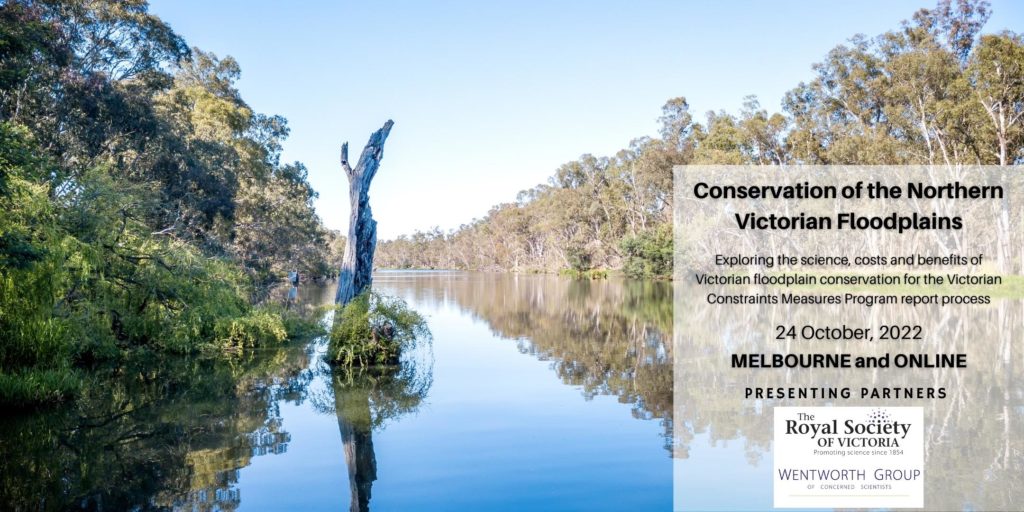Postponed: Conservation of the Northern Victorian Floodplains
*Please note – we regret to advise this symposium has been postponed in deference to communities responding to current flood events in the affected areas. Apologies for any inconvenience or disappointment. We will reconvene in 2023.
Presented by the Royal Society of Victoria and the Wentworth Group of Concerned Scientists.

An important opportunity has arisen in Victoria for the conservation of the Murray-Darling Basin (MDB)’s rivers and sustainable development for river communities. The Victorian Government has asked a Consultative Committee into the Victorian Constraints Measures Program to report by December 2022.
Further, changes to both the Victorian and Federal governments and an increasing focus on implementation of the MDB 2013 Constraints Measures Strategy ahead of a 2024 reconciliation (audit) provide impetus for positive change.
The Royal Society of Victoria and the Wentworth Group of Concerned Scientists are hosting this symposium to synthesise scientific knowledge on the costs and benefits of river floodplain restoration to inform the Victorian consultation process.
Northern Victorian Floodplain Restoration
Conservation of river ecosystems, such as Victoria’s extensive redgum forests, depends on water releases from dams filling river channels and spilling out onto floodplain wetlands. Without regular watering, extensive areas of the redgum forests and other wetlands will be lost. State and federal governments agreed in 2013 to a “constraints management” strategy to purchase easements from farmers for temporary and occasional inundation of low-lying paddocks along the River Murray and its key tributaries.
However, implementation has stalled. Some landholders are concerned over the accuracy of inundation mapping or oppose watering all together. There is debate about the appropriate scale of the floodplain restoration in a changing climate and whether restoration may enable more water recovery for the environment.
The Problem
The governments have communicated floodplain restoration as an impost on local communities rather than offering many benefits, which include:
- flood risk reduction;
- pasture growth;
- groundwater recharge;
- fish breeding;
– and considerable local infrastructure investment, and all with little or no land use change.
Floodplain restoration is an important biodiversity conservation and climate change adaptation measure, generating environmental and socio-economic benefits for a future that anticipates less reliable water.
Since 2008 the Federal Government has acquired environmental water at the cost of billions of dollars to implement the Murray-Darling Basin Plan. However, without agreements with farmers the water acquired can’t be used for broadacre wetlands conservation due to fears of damages claims.
The Opportunity
Floodplain restoration along the Goulburn River would enable 12,000 of 13,000 hectares of wetlands to be directly conserved. In combination with NSW, along the River Murray 375,000 hectares could be watered plus more areas in South Australia. The incoming Federal Government has allocated funding and is committed to overcoming this impasse.
Symposium Aims
The science of the costs and benefits of Victorian floodplain conservation needs to be synthesized and communicated, to contribute to the Victorian consultation process. This one-day symposium will bring together leading biophysical and social scientists, Indigenous and other local knowledge holders, and government agency leadership to share knowledge on floodplain restoration.
We aim to provide a formal input to the Victorian Government’s consultation process on the Victorian Constraints Measures Program from these proceedings.
The Program
 Program Chair: Professor Kate Auty
Program Chair: Professor Kate Auty
Professorial Fellow, The University of Melbourne
Chair, Environment Protection Authority Victoria
Session 1: Context
 – Constraints and the coordinated management of water for the environment
– Constraints and the coordinated management of water for the environment
Andrew Reynolds, Executive Director, River Management, Murray-Darling Basin Authority
 – Traditional owners’ perspectives of floodplain management
– Traditional owners’ perspectives of floodplain management
Yorta Yorta Nation Aboriginal Corporation (speaker TBC)
 – Interdisciplinary work across knowledge disciplines to enhance floodplain management practices
– Interdisciplinary work across knowledge disciplines to enhance floodplain management practices
Professor Robyn Watts, Gulbali Institute for Agriculture, Water & Environment, Charles Sturt University
Session 2: Flood Plain Processes
 – The ecological needs of floodplain forests and other wetlands
– The ecological needs of floodplain forests and other wetlands
Associate Professor Matt Colloff, Fenner School of Environment & Society, Australian National University
 – The ecological needs of fish
– The ecological needs of fish
Professor John Koehn, Gulbali Institute for Agriculture, Water & Environment, Charles Sturt University
 – The ecological needs of waterbirds
– The ecological needs of waterbirds
Professor Richard Loyn, School of Agriculture, Biomedicine and Environment, La Trobe University
 – Goulburn River flows and constraints
– Goulburn River flows and constraints
Mr John Pettigrew, President, Goulburn Valley Environment Group & Board Member, Murray Darling Wetland Working Group
Session 3: Water
 – Trajectories of change and water quality on floodplains
– Trajectories of change and water quality on floodplains
Emeritus Professor Peter Gell, Institute of Innovation, Science & Sustainability, Federation University
 – Climate change challenges and opportunities
– Climate change challenges and opportunities
Dr Francis Chiew, Surface Water & Basin Outcomes, CSIRO
 – Hydrological constraints and opportunities
– Hydrological constraints and opportunities
Dr Eytan Rocheta, Wentworth Group of Concerned Scientists
 – Ecosystem service benefits from floodplain restoration
– Ecosystem service benefits from floodplain restoration
Professor Max Finlayson, Gulbali Institute for Agriculture, Water & Environment, Charles Sturt University
Session 4: Governance
 – Floodplain restoration policy options
– Floodplain restoration policy options
Professor Jamie Pittock, Fenner School of Environment & Society, Australian National University & Wentworth Group of Concerned Scientists
– Rapporteur’s summary and next steps.

Symposium Close & Networking Function
Tickets are available below to participate in the webinar via Zoom and/or Eventbrite. RSV Members are prompted to enter their “promo code” to access a member’s ticket. Alternatively, you can watch the livestream from our YouTube channel at the appointed hour without purchasing a ticket.
*Please note – we regret to advise this symposium has been postponed in deference to communities responding to current flood events in the affected areas. Apologies for any inconvenience or disappointment. We will reconvene in 2023.






